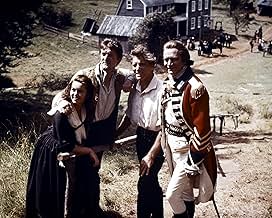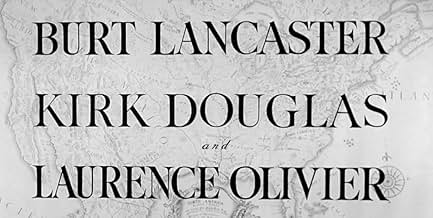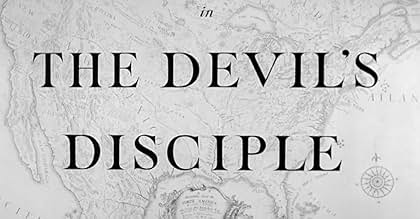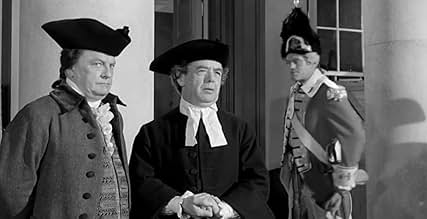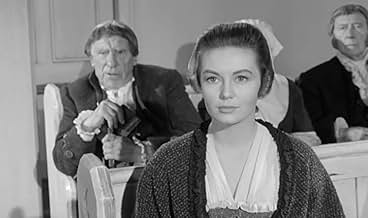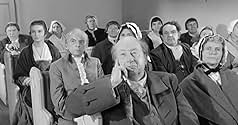IMDb RATING
6.9/10
3.1K
YOUR RATING
The black sheep of a family and the local minister discover their true vocations during the Revolutionary War.The black sheep of a family and the local minister discover their true vocations during the Revolutionary War.The black sheep of a family and the local minister discover their true vocations during the Revolutionary War.
- Directors
- Writers
- Stars
- Nominated for 1 BAFTA Award
- 1 nomination total
Neil McCallum
- Christie Dudgeon
- (as Neil Mc Callum)
Joe Beckett
- British Officer
- (uncredited)
Steven Berkoff
- British Corporal
- (uncredited)
- Directors
- Writers
- All cast & crew
- Production, box office & more at IMDbPro
Featured reviews
"The Devil's Disciple" is based on a play by George Bernard Shaw. It recalls of a page in the history of the American Revolution. The play and this film interject considerable humor and satire in otherwise serious matters of the time. All of the cast are good in their roles.
Burt Lancaster is the Rev. Anthony Anderson. Kirk Douglas is a rogue patriot, Richard Dudgeon. Laurence Olivier is the epitome of the arrogant and unbending British general, Burgoyne. Janette Scot plays Anthony's wife, Judith Anderson. She's a conflicted woman after she meets Dudgeon. She loves her husband but also falls for Dudgeon, in his adventurous ways. But two can play at that, as she find outs with Anthony at the end of the film. Harry Andrews flourishes in yet another of his fine British uniform portrayals.
The story takes place in the days of leading up to and the start of the American Revolution. Shaw's sarcasm and cynical treatment of some of the beliefs of the time underlie the story. The film isn't exceptional, but Lancaster's production company pulled together a stellar cast for this humorous look at history and poking fun through the pen of G.B. Shaw.
This is the third film that Lancaster and Douglas made together. Most movie buffs should find the film amusing.
Burt Lancaster is the Rev. Anthony Anderson. Kirk Douglas is a rogue patriot, Richard Dudgeon. Laurence Olivier is the epitome of the arrogant and unbending British general, Burgoyne. Janette Scot plays Anthony's wife, Judith Anderson. She's a conflicted woman after she meets Dudgeon. She loves her husband but also falls for Dudgeon, in his adventurous ways. But two can play at that, as she find outs with Anthony at the end of the film. Harry Andrews flourishes in yet another of his fine British uniform portrayals.
The story takes place in the days of leading up to and the start of the American Revolution. Shaw's sarcasm and cynical treatment of some of the beliefs of the time underlie the story. The film isn't exceptional, but Lancaster's production company pulled together a stellar cast for this humorous look at history and poking fun through the pen of G.B. Shaw.
This is the third film that Lancaster and Douglas made together. Most movie buffs should find the film amusing.
Lancaster and Douglas had a rare and unique Hollywood relationship. Though they could easily have been rivals (and in some ways were), they formed a sort of onscreen "buddy team", working together many times and using their own traits of one-upmanship to lift various projects to a high level of achievement. Their competitiveness, paired with their mutual respect, led to some memorable movies. This is a lesser-known effort of theirs, but is, by no means, an inferior one. Lancaster is a gentle Revolutionary War-era minister, married to the lovely, but puritanical Scott. When the war reaches a fever pitch and local townsfolk begin to hang from the gallows, a roguish prodigal son (Douglas) returns to stir things up. Douglas and Lancaster form an uneasy alliance with each other until Douglas is arrested, mistaken for Lancaster who has buried a "rebel" without permission. The commanding British officer is Olivier, who knows that the war is hopeless, but continues to play it out with a sort of bemused detachment. Though the film contains a fair amount of action, it is really a witty, clever parade of words and thoughts (based on a George Bernard Shaw play) shedding a humorous and ironic light on a page in U.S. history. Lancaster is mellow for much of the film, but effective (and tan! The audience gets to see his muscular back in the film, though Scott is too demure to look upon it herself!) Douglas starts off VERY big, with distractingly dark and satanically groomed eyebrows. Fortunately, he overcomes this gimmick and turns in a solid performance. Olivier is very good, but doesn't really take the reigns of his role to the highest level (and has limited screen time in any case.) Andrews gives a very nice supporting turn as his exasperated right-hand man. Scott does some of her best work as the straight-laced bride who can't help but find herself drawn to the rough-hewn charms of Douglas, though the very idea tortures her. Her best moment comes when Douglas asks her to kiss him and she exclaims, "I can't!" (yet immediately thrusts herself onto him for a lengthy smooch!) As history, the film is dubious at best (and even recognizes this itself!), but, at a tight 83 minutes, it's a delightful diversion featuring a great combination of actors and stars. It doesn't overstay its welcome and has a light touch throughout. (Oh, and check out the stop-motion figures that show up during the voice-over narration! What a hoot!)
Oddly enough, very few good films have been made about The American revolution, and this is one of them.Kirk Douglas and Burt Lancaster put in very fine performances, with Lancaster acting against type as the priggish, self-righteous minister who transforms himself into a dashing, wickedly, hero, and Kirk Douglas as the sardonic, cynical, Satanic, selfish, and utterly delightful Dick Dudgeon, who transforms himself inot an altruistic, self sacrificing hero. Laurence Oliviers performance is little too langourous and flat, until he delivers the films great punch-line, "history will lie, as usual." Of course, it may be that the films sharp-eyed, toughly ironic view of the revolution has militated against it ever gaining the popularity it deserves
Kirk Douglas plays the title character with charm and panache, Lancaster delivers one of his best performances, and Olivier is an absolute delight in his smooth-as-silk portrayal of "Gentlemanly Johnny!" A pleasure to watch -- Bravo!
Burt Lancaster and Kirk Douglas shared a chemistry -- offscreen as well as on screen -- which was rare even by Hollywood standards. There's a legend about them, as a matter of fact (and I'd hate to think it apocryphal), that -- at the onset of each of the many films in which they co-starred -- they flipped a coin to see who would play which role.
In their film adaptation of George Bernard Shaw's "The Devil's Disciple," the coin-flip would have been at best symbolic -- or perhaps ironic is the term here -- inasmuch as the plotline concerns role reversals and identity switching. Set during the closing days of the American revolution, Dick Dudgeon, the town rakehell (Douglas), having previously admitted to Reverend Anderson, the local minister (Lancaster), "Pastor, there's something about you I respect, and that makes me want you for my enemy," allows himself to be mistakenly arrested as that minister by British troops. It's an act which even he, at the time, is at a loss to explain. While Dudgeon keeps the local British commandant, General Burgoyne (Laurence Olivier in what turns out to be one of his finer screen performances), alternately amused and bemused, Reverend Anderson discovers within himself a call to action as he rallies the rebel troops to rescue Dudgeon and to cut off Burgoyne's reinforcements.
Purists may note that the film adaptation tampers with Shaw's more typically cynical resolution in the original stage presentation (yes, it is much more 'upbeat' and true to the Hollywood dicta of the day) . . . and yet the Shavian quality of the dialogue between Dudgeon and Anderson -- not to mention the barbed repartee between Dudgeon and Burgoyne -- is preserved virtually intact here. It is also brilliantly rendered by all parties.
Although Douglas manages to 'steal' much of this film, Lancaster affords us more than a glimpse of the ability which will, in little more than another year, garner him an Oscar -- for 'Elmer Gantry'-- (and put an end to the yearly ritual of his and Douglas' comedic "It's So Great Not To Be Nominated" performance at the awards ceremonies).
One of Hollywood's more successful adaptations of a stage play, this is also a film which, more than most, stands the test of time.
In their film adaptation of George Bernard Shaw's "The Devil's Disciple," the coin-flip would have been at best symbolic -- or perhaps ironic is the term here -- inasmuch as the plotline concerns role reversals and identity switching. Set during the closing days of the American revolution, Dick Dudgeon, the town rakehell (Douglas), having previously admitted to Reverend Anderson, the local minister (Lancaster), "Pastor, there's something about you I respect, and that makes me want you for my enemy," allows himself to be mistakenly arrested as that minister by British troops. It's an act which even he, at the time, is at a loss to explain. While Dudgeon keeps the local British commandant, General Burgoyne (Laurence Olivier in what turns out to be one of his finer screen performances), alternately amused and bemused, Reverend Anderson discovers within himself a call to action as he rallies the rebel troops to rescue Dudgeon and to cut off Burgoyne's reinforcements.
Purists may note that the film adaptation tampers with Shaw's more typically cynical resolution in the original stage presentation (yes, it is much more 'upbeat' and true to the Hollywood dicta of the day) . . . and yet the Shavian quality of the dialogue between Dudgeon and Anderson -- not to mention the barbed repartee between Dudgeon and Burgoyne -- is preserved virtually intact here. It is also brilliantly rendered by all parties.
Although Douglas manages to 'steal' much of this film, Lancaster affords us more than a glimpse of the ability which will, in little more than another year, garner him an Oscar -- for 'Elmer Gantry'-- (and put an end to the yearly ritual of his and Douglas' comedic "It's So Great Not To Be Nominated" performance at the awards ceremonies).
One of Hollywood's more successful adaptations of a stage play, this is also a film which, more than most, stands the test of time.
Did you know
- TriviaThe character of The Reverend Anthony Anderson was loosely based on the historical figure of Peter Muhlenberg, known as the "Fighting Parson of the American Revolution".
- GoofsSeveral times while going through the forest, the British refer to "snipers." However, the term sniper didn't come into being until about 40 years after the American Revolutionary War. The term came into usage in 1824, while the war ended in 1783.
- Quotes
Major Swindon: What will history say, sir?
General John Burgoyne: History, sir, will tell lies, as usual!
- Crazy creditsThe opening credits appear over a map of North America during the Revolutionary War, which then zooms into an animated battle played out by paper models.
- ConnectionsReferenced in Un numéro du tonnerre (1960)
- SoundtracksYankee Doodle
(uncredited)
traditional 18th Century Anglo-American folk song
Heard under main title
- How long is The Devil's Disciple?Powered by Alexa
Details
- Release date
- Countries of origin
- Language
- Also known as
- Le Disciple du diable
- Filming locations
- Production companies
- See more company credits at IMDbPro
Box office
- Budget
- $1,500,000 (estimated)
- Runtime1 hour 23 minutes
- Color
- Aspect ratio
- 1.85 : 1
Contribute to this page
Suggest an edit or add missing content



